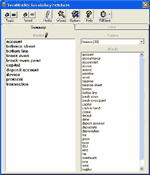eflSoft.com is dedicated
to developing software that enhances English language learning and teaching.
Recent thinking in vocabulary teaching
is tending towards a dynamic, process-centred approach. Vocabulary
learning is being seen more and more as a skill in which responsibility
lies with the learner to develop his or her own lexicon. Carter and
McCarthy (1988:16) point out that “...learning words in another
language cannot be easily divorced from motivational factors such
as how important or useful lexical items are perceived to be by learners
themselves.” VocabBuddy has been
created for learners of English with this in mind.
Teachers of EFL and ESL recognise that it is difficult
to select vocabulary items to cover with their classes since language
learners bring with them widely different vocabulary needs - a word
unknown to one student may well be very familiar to his or her neighbour.
Furthermore, research has shown that much vocabulary, in English or
in other languages, is learned by the students individually through
reading, and not deliberately, under the teacher’s control in
the language class.
Many EFL teachers recommend that students use traditional
vocabulary notebooks to take notes on vocabulary items that they encounter
for the first time in order to facilitate retention. Several TEFL
teachers’ guides place importance on this aspect of the vocabulary
learning process. Indeed, Woolard (2000:44) states “It is now
clear that we need to give vocabulary notebooks a far greater priority
in language teaching, and raise our students' awareness of the dynamic
role they have to play in the process of learning a language.”
VocabBuddy is designed in
line with the increasing trend in CALL away from the idea of the computer
as a tutor to that of the computer as a tool. (Levy1997). The tutor
role is one in which the computer is used to transmit knowledge and
skills whereas in the role of tool it empowers learners to carry out
learning tasks.
References
Carter, R. & McCarthy, M. (eds.) (1988) Vocabulary and Language
Teaching, Longman, London.
Levy, M. (1997) Computer-assisted language learning: Context and
conceptualization, Oxford University Press, New York.
Woolard, G. (2000) Collocation - encouraging learner independence,
in Teaching Collocation, ed. Lewis, M., Language Teaching Publications,
Hove, pp. 28-46. |
 |
VocabBuddy
- Available Now! |
VocabBuddy
- the electronic vocabulary notebook that enables English
language learners to:

• Create their own dictionaries of English words and
phrases each with notes, meanings, examples and pictures.
• Mark difficult or important vocabulary items in a
Hot List.
• Listen to the pronunciation of vocabulary items, definitions
and sentences with VocabBuddy's built in access to Microsoft
Text to Speech Technology.
• Play word games to help with retention of the vocabulary
items in their dictionaries or Hot List.
View the VocabBuddy awards
|
 |
VocabBuddy Lite
for Teachers |
 A
FREE lite version of VocabBuddy
for teachers and students in EFL, ESL, and language teacher
education programs such as CELTA. A
FREE lite version of VocabBuddy
for teachers and students in EFL, ESL, and language teacher
education programs such as CELTA.
• Completely FREE!
• Populated with TEFL words and phrases
•
Limited feature set
|
|



